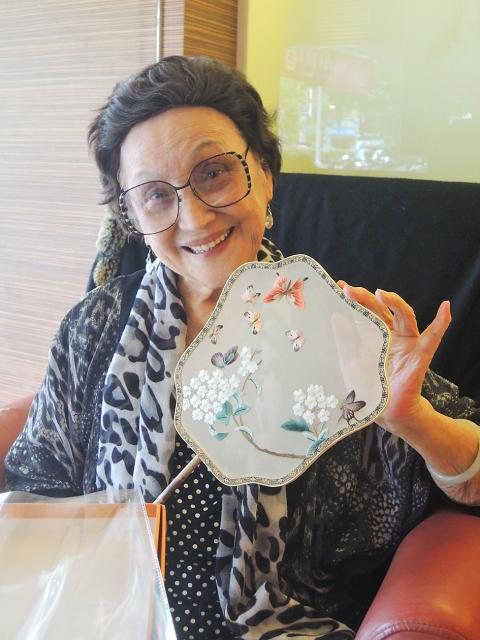Dai Yu-mei (戴玉妹), an 88-year-old Saisiyat woman born in Hsinchu County’s Wufeng Township (五峰), has devoted most of her life to teaching people how to sing and dance.
Dai left for Taipei at the age of 15 and at the time was the only Aborigine student at Taipei Female Normal School.
She could only speak the Saisiyat language and Japanese, and had to spend time learning Mandarin and getting used to her new surroundings before she could focus on her studies.

Photo: Liao Hsueh-ju, Taipei Times
Dai’s outstanding singing and dancing skills helped her gain special approval to directly apply for the Department of Music at National Taiwan Normal University.
After graduating from university, the school hired her to teach music and aerobics.
She was later sent to the Philippines by the government to sing and dance as part of cultural exchanges, and took her students to perform in Japan and other nations.
Dai also performed for military personnel and served as a director for a cultural task force teaching song and dance.
She worked as a choreographer in the movies Wu Feng (吳鳳), Song of Orchid Island (蘭嶼之歌), Romance at Sun Moon Lake (日月潭之戀) and Love of Carter (馬車夫之戀).
Dai also instructed singer Yang Shiao-ping (楊小萍) and other celebrities when she worked at the Unite Hotel music hall.
As Dai has taught many famous singers and actors, she is well-respected in show business.
“I was very strict when instructing them, but the achievements of my students and their care for me is my greatest comfort,” Dai said, adding that she receives greeting cards from her students on her birthday every year, and some of them bring her a red envelope or a birthday cake to celebrate with her.
Dai said her father was a police officer and she had to leave her home at a young age and learn to rely on herself.
Whenever she missed her parents, she would hum a song called Try Hard to Climb Up a Mountain (努力,爬上山) to encourage herself and relieve her homesickness, she said.
Dai said she is grateful for all the people who have helped her along the way, allowing her to do what she loves for a living and contribute to society.
“I am a barrel of laughs for everyone,” she said, adding that she was a teenager at Chingchuan Hot Springs in Wufong, where former warlord Chang Hsueh-liang (張學良) was placed under house arrest by former president Chiang Kai-shek (蔣介石).
She said she would lead other children in singing and dancing to entertain Chang, military personnel and police officers.
They would even cry when they heard songs that reminded them of their hometowns, Dai said, adding that Chang loved her singing and even taught her Mandarin.
She found out Chang was an important person only after she went to university, Dai said, adding that when they met by chance in Taipei several years later, when Chang was no longer imprisoned, both wept while embracing each other.
Dai said she asked him: “Why has your hair all turned white?”
Her husband and son have passed away, and her daughter is living abroad, but calls her every day, Dai said, adding that although she lives alone, she has an optimistic perspective.
“I never look back. Every day of my elderly life is full of sunshine,” she said, adding that she lives every day happily with a visit to a coffee shop to read the newspaper, listen to music and chat with friends.

Beijing could eventually see a full amphibious invasion of Taiwan as the only "prudent" way to bring about unification, the US Department of Defense said in a newly released annual report to Congress. The Pentagon's "Annual Report to Congress: Military and Security Developments Involving the People's Republic of China 2025," was in many ways similar to last year’s report but reorganized the analysis of the options China has to take over Taiwan. Generally, according to the report, Chinese leaders view the People's Liberation Army's (PLA) capabilities for a Taiwan campaign as improving, but they remain uncertain about its readiness to successfully seize

Taiwan is getting a day off on Christmas for the first time in 25 years. The change comes after opposition parties passed a law earlier this year to add or restore five public holidays, including Constitution Day, which falls on today, Dec. 25. The day marks the 1947 adoption of the constitution of the Republic of China, as the government in Taipei is formally known. Back then the Chinese Nationalist Party (KMT) governed China from Nanjing. When the KMT, now an opposition party in Taiwan, passed the legislation on holidays, it said that they would help “commemorate the history of national development.” That

Taiwan has overtaken South Korea this year in per capita income for the first time in 23 years, IMF data showed. Per capita income is a nation’s GDP divided by the total population, used to compare average wealth levels across countries. Taiwan also beat Japan this year on per capita income, after surpassing it for the first time last year, US magazine Newsweek reported yesterday. Across Asia, Taiwan ranked fourth for per capita income at US$37,827 this year due to sustained economic growth, the report said. In the top three spots were Singapore, Macau and Hong Kong, it said. South

Snow fell on Yushan (Jade Mountain, 玉山) yesterday morning as a continental cold air mass sent temperatures below freezing on Taiwan’s tallest peak, the Central Weather Administration (CWA) said. Snowflakes were seen on Yushan’s north peak from 6:28am to 6:38am, but they did not fully cover the ground and no accumulation was recorded, the CWA said. As of 7:42am, the lowest temperature recorded across Taiwan was minus-5.5°C at Yushan’s Fengkou observatory and minus-4.7°C at the Yushan observatory, CWA data showed. On Hehuanshan (合歡山) in Nantou County, a low of 1.3°C was recorded at 6:39pm, when ice pellets fell at Songsyue Lodge (松雪樓), a